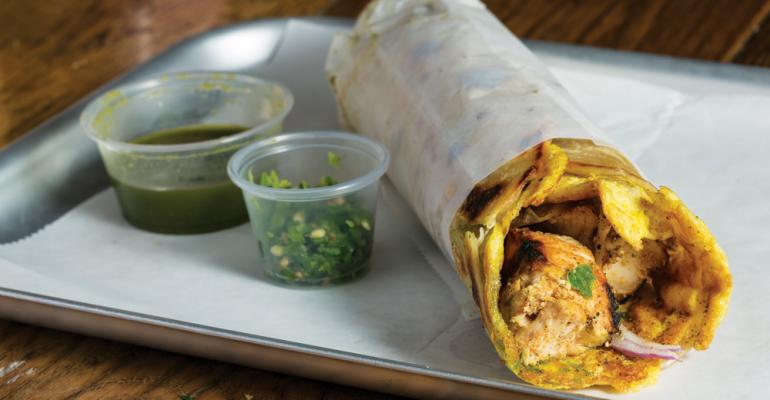A kati roll is something many American consumers can easily wrap their heads — and hands — around.
Originally from Kolkata, India, a kati roll consists of marinated meats or spiced potatoes wrapped in a flaky flatbread called a paratha. Convenient, customizable, portable and unintimidating, it is essentially an Indian burrito.
Payal Saha, founder of The Kati Roll Company, and herself originally from Kolkata, would like to see it become just as common.
The Kati Roll Company has humble origins, and the concept’s name was meant as a joke. Saha’s first restaurant, which opened in 2002, was a tiny, 300-square-foot space near New York University. It was barely a restaurant, let alone a company.
But today, Saha and her husband, Anil Bathwal, who quit his job as an advertising executive to help run the restaurants full time, have four locations in New York City and one in London, and they’re ready to expand.
The menu has been updated over the years with more vegetarian options, such as rolls filed with paneer, a mild, fresh cheese, or crushed vegetable croquettes. Customers also can choose a whole-wheat griddled roti as a wrapper instead of a paratha.
The rolls are priced between $3.50 for an egg-stuffed Unda Roll to $6.75 for a kati roll stuffed with shrimp marinated in coconut milk and spices, another one of Saha’s inventions.
The chain also has a growing line of lassi, a yogurt-based drink in flavors such as traditional mango, as well as berry, saffron-pistachio and orange blossom, all made with organic yogurt.
Breakout Factors:
- The Kati Roll Company taps the hot culinary niche of Indian cuisine, which is on the rise.
- The chain has good infrastructure, with a central commissary where lassis are made and meat is marinated
- Healthful options like whole-wheat rotis, organic yogurt and lassis are available.
All photos courtesy of The Kati Roll Company
Contact Bret Thorn at [email protected]
Follow him on Twitter: @foodwriterdiary





